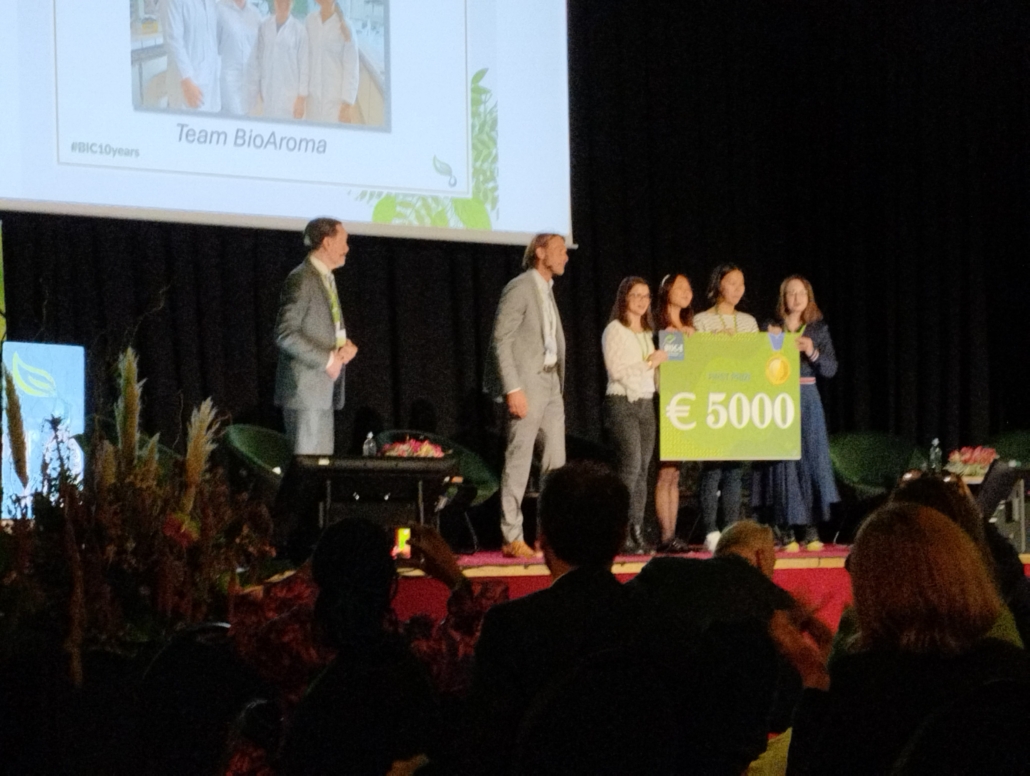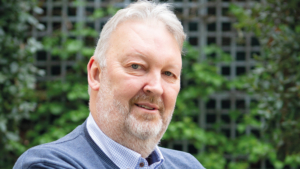
French team BioAroma awarded with BISC-E 2023 prize
At the celebration of the 10th anniversary of the Bio-based Industry Consortium (BIC), the student team BioAroma was presented with the BISC-E 2023 award, which comes with €5000 in prize money.
In front of around 200 invited guests, the French team received the cash prize for first place in the BISC-E 2023 competition and a one-year free BIC membership at the anniversary celebration. The annual competition is part of BIC’s efforts to promote entrepreneurship in education by challenging students to propose breakthrough bio-based innovations to solve environmental, societal or economic problems.
Nurdana Orynbek, Anastasyia Valakhanovitch and Aiganym Abduraimova from AgroParisTech presented their innovative fermentation process using a non-GMO yeast strain to produce 2-phenylethanol (2-PE) from apple pomace and whey. The aromatic substances with a rose-like scent are increasingly used in the cosmetics and food industries. The biotechnological process has the potential to replace the currently used toxic chemical synthesis of 2-PE or the costly, labour-intensive and seasonal extraction from flowers.
Apple pomace is a by-product generated by apple juice and cider manufacturing and represents up to 30% of the original fruit weight. The global apple pomace quantity varies between 4-7 million metric tonnes per year. BioAroma has demonstrated the economic feasibility of its process and achieved a competitive price compared to that of 2-PE extracted from flowers. Besides, the team’s solution addresses the current environmental issues of the flower extraction method, with 1,000 times lower impacts on land use and GHG emissions.
Belgian team Vsycle took second place with an approach to save fruit from frost damage by usage of a novel antifreeze proteins (AFPs) to spray on fruit blossoms of apples, pears, berries and grapes. Their AFP product is non-toxic, biodegradable, and remains active even at low concentrations. Third place went to Team O-LIVE from Italy who are making resources for the cosmetic industry from waste cooking oils. They obtain oleic acid from the waste cooking oils using an enzymatic reaction catalysed by lipase. This oleic acid is then used to make oleyl alcohol, a biocompatible resource in the cosmetic industry as an emollient, solvent, viscosity control and perfuming agent. Their enzymatic processes replace the chemical synthesis usually used to produce oleyl alcohol.
In addition to much praise for the cooperation between the Bio-based Industry Consortium and the European Commission, the speakers also voiced criticism. Although the bio-economy was conceived in Europe and first pursued as a political concept, said its spiritual father Dr. Christian Patermann, more and more Asian countries and also the USA are leaving Europe behind in its implementation. The reasons include bureaucratic obstacles for SMEs, a lack of willingness to invest and determination to implement.
One year after the USA declared the biologisation of food and drug development a national priority, however, funds and concrete implementation concepts are available, explained MaryMaxon, Executive Director of the US think tank SchmidtBioFutures.
According to plenary speaker Jim Philp, Science and Technology Policy Analyst at OECD, 90% of the investments for the circular bioeconomy have been made in the UK and the US so far. He cited the British biohubs Synbicyte and the London Biofoundry as innovative financing and incubator models. The potential of the bio-based bioeconomy to sustainably address global challenges such as climate change must be complemented by current developments in synthetic biology and data analysis, he said, and political incentives must be provided.
The first BIC Chair Marc Wubbolts, CEO of the joint venture between DSM and Fonterra, said the picture has changed in 10 years of BIC. If you started with 30 large companies, today 80% of the innovators are SMEs. BIC Chair Rob Beekers emphasised to European Biotechnology that there is too much regulatory burden in the EU compared to the US, that the opportunities of synthetic biology in production need to be used more and that Europe can compete with the US in terms of co-product development. Patermann stressed that Europe urgently needs an update of its bioeconomy strategy, also in view of the exploding market for novel foods and protein alternatives, and that new financing channels must be found.



